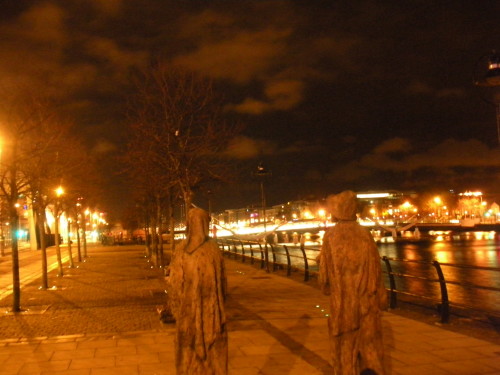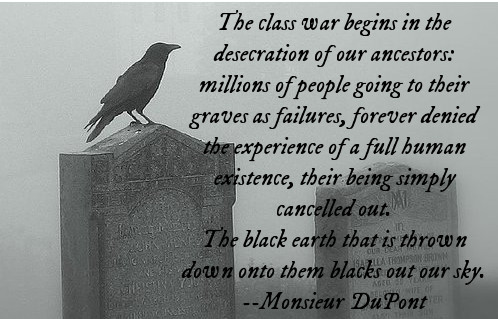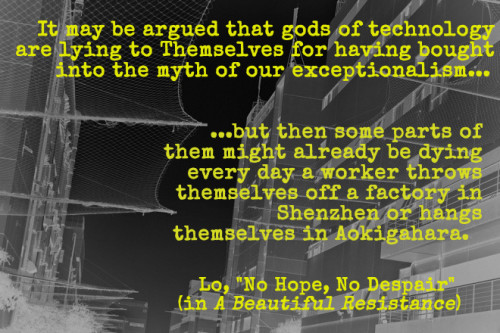“When you hunt for souls in the winter rain
I shall listen in the gaps between towns knowing
Your face is the night storm of the underworld
And you shall bring terror to end all terror.”
From Enchanting The Shadowlands, by Lorna Smithers
The Hunter Of Souls
Recommended listening while reading:
Waiting for a band to play, I thumbed through a Nihilist tract and remember what it means to be mortal while silver-and-black antlers sharpen against flesh.
I remember: it’s from the Dead we weave our lives. It’s from the Dead we weave our Meaning.
The Cauldron of Awen is as Black as the Cauldron of Annwn, and from both spring the songs of Meaning.
The antlers coming for me, silver-on-black, black-on-silver, White one of Nudd hunting in the chill winter.
I’m on a cat-piss soaked carpet with witch-punx and anarcho-queers in a crowded room, chewing rosemary (and breaking off bits of it for others who asked) at these folks’ feet, waiting for a band to start. And then they start, and the nothing under everything becomes the very threads from which we weave our meaning.
Everyone has gone elsewhere.
Elsewhere descends and envelops all, Annwn and the grave but also the stars whispering around you, a strange and long-looked for comraderie of all that’s passed and all that will pass…and you with them.
Everyone goes elsewhere when they play–people closing their eyes in dark contemplation but smiling, remembering someone, remembering something, remembering, embraced in arms stronger than anything living.
And then I stare at Death.
What the Dead Want With A Wig
The structure of the world was built by the dead, they were paid in wages, and when the wages were spent and they were dead in the ground, what they had made continued to exist, these cities, roads and factories are their calcified bones.
— Monsieur DuPont
I remember watching as they pumped her shirtless chest, her full body jostling with each compression, her breasts flopping. But it wasn’t her nakedness which undignified her under the attention of these men. What seemed to bother her most was that her wig had fallen off.
She was dead already. The paramedics knew this. I had known this when I’d found her toppled over on her face out of her wheelchair. I’d known this when I tried to roll her heavy body over and her wig fell off and she didn’t say a word.
She was a client of mine at one of the residential facilities where I worked as a counselor. Sweeter than any other client I’d had, politely dismissing any offers of help but always gushing happily when one of us did something for her unbidden. The countenance and personality of an innocent young girl in an adult chain-smoking woman’s body, a mis-match you see quite often when working with folks with mental-illness.
And she was dead, and her wig had fallen off.
I couldn’t find a pulse, couldn’t turn her body over by myself. Another client had called the medics; I already heard the sirens. There was nothing I could do but the one thing she wanted in life, the thing I heard her demanding in death.
I put her wig back on and waited.
When the medics showed up I found myself trapped in a corner of the hallfway with the client who’d alerted me to the crisis. For 30 minutes we were stuck, unable to move, watching first as the medics tried to compel life back into the dead woman’s body, and then waiting for them to move her so we could leave. For half an hour we sat, watching, both of us fixated not on the tension and heroics of the professionals, nor the sorrow of the woman’s passing, but on the wig they’d let fall again onto the floor.
“I wish they’d at least put her hair back on,” said my companion, clutching my arm tightly. “She was so worried anyone would ever see her bald.”
I nodded, but more to the place I saw the woman lingering, not to the place her body lay, flailing, undignified,
hairless.
Why should the dead care about a wig? We might as well ask what the living might care for a wig; mere adornment to hide or alter an appearance which, under all our social glamour, is still flesh bone and shit. A wig is nothing–just some hair to hide other hair or a lack thereof, mere accoutrement to our vision of the flesh.
Yet isn’t anything we build thus? All the art, the music, the words and deeds, the monuments, the streets, the legacies and lore–all of it a sort of clothing pulled over constantly dying flesh. We are born; we love; we create; and then we die. Under all that glamour is the relentless truth of Death and, before and after our own, the deaths of others.
The City & The Dead
We need to offer the death rites in a culture that pretends that death can be cheated by buying the latest i-gadget or hooking ourselves up to plasma bags of young blood. These technological and scientific responses do not account for the wider environment which we do not control, but which now seeks to redress the killing balance and is doing so with storm surge and wildfire and tornado and flood and drought regardless of what is playing on your headphones or how high the gates are to your compound.
— Peter Grey, Rewilding Witchcraft
A week before I would huddle with twenty others inside the 6000 year-old tomb of Newgrange, I trudged through the rain-soaked streets of Dublin on my way to a ferry to Wales. It was just after 4 am; a chill coastal wind came sweeping across the old stones with voices whispering on those winds.
I walked with the dead; dead I did not know but could hear before the light rose.
Anti-government slogans were painted on every sign post, against fracking, against water privatisation, against Capitalism. The running narrative etched in paint and ink spoke with those voices – the dead muttering the words from withered-tongue jaws, voiceless like the warriors raised from the Cauldron of Annwn.
They fell silent just as the city became…nice. You know those parts–the clean streets, the bright lights, clear windows behind which Capitalist abundance boasts itself onto the pavement. Every city’s got those nice parts, where shoppers and high-powered business people can stroll without stepping in homeless-piss, where all the horrors of poverty are obscured in the dazzling light of commerce. No more slogans, no more arguments, just empty, pretty streets…

[Dublin Famine memorial. Photo Credit: R. Wildermuth]
In the business district of Dublin stand famine-withered statues shambling out to the sea, the finitude, the limit of the human form against the march of progress.
Not every city has a stone monument to the homeless, emaciated, zero-ed out refuse of Modernity. Most only have the temporary sorts of memorials, the cardboard boxes in alley-ways and doorways, the sleeping bags and tarps and half-eaten take-out containers jumbled together in a pile under which some shadow of humanity lingers, dead-alive, walking the thin threshold between the dim lights of the underworld and the pale artificial lights of our own.
The dead speak a little louder in Dublin, though. On my altar is dirt from a mass-grave, the Croppy Acre into which an Empire dumped the mangled, unremembered bodies of those fool enough to resist.
Dirt from that grave sits next to dirt from Karl Marx’s, bones and ash of corvids, and they become difficult to separate after awhile, particularly when winter’s chill sharpens our awareness of what little life’s given us.
The Death of All Meaning
Death is our zero point, our nothingness.
We can ascend every height; stare down any cliff-edge; raise any tower. We can speak to the spirits; thumb our hand-held screens; annihilate entire cities. We can worship gods or not, laugh at sorrow or cry, fly great distances or descend into the sea. We can love, or hate, or create, or destroy.
But under this all is Death, the pale voiceless corpse, our lost stories, our tales tapering off into silence not for lack of words but absence of tongue. What meaning can we derive from death, when it is itself the Abyss into which all meaning leaks out?
Fight against this if you must.
Dismiss this if it helps.
But better, I say, embrace this. Death is the end of meaning, and also its primary cause.
“And if thou gaze long into an abyss, the abyss will also gaze into thee.”
The Abyss of Death is endless, but it is inhabited. Dwelling in Death are the Dead, just as they dwell within us. The soil in which our food grows is ground-up stone and Dead, our bodies nourished by the decomposition of innumerable corpses. Compressed black rock and oils fuel our industry and our trips to see grandma over the holidays, herself soon to retire into the Abyss of all meaning.
To deny the Dead is to live in fantasy. Thumb the small screen faster; shoot the heroin deeper; drown out the silence with every noise we can make against that final hour in which all Meaning is born.
Stare into the abyss long enough and the abyss stares back, said that guy we’re all afraid to read. Like Marx, so much propaganda is arrayed against Nietzche that his name has become verboten, evoking shudders, disdain, or a barely adolescent lust akin to the time a boy first types the word ‘breasts’ into a search engine.
We make our own meaning. Pagans are all doing this, yet warring over the finer points of our constructions. Masturbatory fantasies of a primitive Matriarchy or a future utopia to counter the horrors of the modern are fine for weekend retreats, but none of that stops unmanned drones from obliterating brown people to secure our oil supply, nor the workers from plummeting to their deaths from the roofs of factories. It’s all ‘teacup talk of god,’ and we’re all dying.
The world is full of the Dead, wheeling us quickly toward our Death.
The Black Earth Blacks Out Our Sky

[Original image public domain. Remixed Credit: Gods&Radicals]
His mother put baked potatoes in his pocket in the morning for the winter walk through flat barren fields to school.
“Why’d she do that?” the boy that I once was asked.
“It was cold, mister.” The old man’s eyes looked happy despite the last 50 years of trying to shake off that poverty. “It took us an hour to walk, and the potatoes kept our hands warm. And when we got to school, we ate the potatoes.”
Alfred Myers left school at 12 to work. Alfred Myers joined the war to fight the Japanese. Alfred Myers married a girl with class, but no money. Alfred Myers worked 60 hours a week for forty-eight years to escape poverty.
Alfred Myers had 4 kids, a house with a pool and a fence. Alfred Myers always paid his taxes, never went over the speed limit, never ‘cheated’ on his wife. Alfred Myers voted in every election.
Alfred Myers retired at 68, ready finally to live a bit, and died the next year.
Alfred Myers worked for others since he was 12, working harder and harder to escape the theft of meaning that is Capitalism, but only escaped it in death.
Alfred Myers was my grandfather. His life ground down into meaninglessness, the works and days of his hands, that good citizen, that veteran of foreign wars gone into the Abyss.
His meaning was the meaninglessness of labour, the shortness of life.
His meaning is now mine.
Dead Labour
Capital is dead labour, that, vampire-like, only lives by sucking living labour, and lives the more, the more labour it sucks. The time during which the labourer works, is the time during which the capitalist consumes the labour-power he has purchased of him.
–Karl Marx

Original image: Suicide nets to prevent worker suicide at iPhone factory, China (public domain). Remixed CC. Gods&Radicals
You’ve already heard this story, the story of Death, the story of extinction, the story of the misery of Capital and the distraction of technology.
You’ve heard the story of the Enclosures, the ‘improvements,’ the hope of human transcendence against the boundaries of nature, the frailty of the human body, the finite forests and degrading soil.
You’ve heard this story because it’s the story of the Dead., the tale of millions of lives crushed under the weight of Capital and Empire.
And it’s the story of the gods, the gods we ignore.
Gods of forests cut down from ancient stands; goddesses of stream and pool choked to death on our fetid technological waste. Where will go the god of the white rhino when the last three of its beings breathes its last breathe? The god of the mountain blown apart. Where will he go when his stone is tumbled-down to get at his coal black heart?
Where do they go?
Where did they go?
The gods have gone to the same place that the shivering woman under a plastic trash bag in an alley has gone, wandering the rain-soaked streets, hunting the few souls brave enough to stare death in the face and recognise it as our final, collective truth.
In Winter Our Revolt Is Born
We see the darkness, and some go in. It is the abyss. We have to find out what is there, to find out if there is meaning.
And we see only the abyss.
And some go mad.
And some never return.
And some come back wielding light against that darkness. Seeing nothing, we bring back fire, we light lamps, candles, torches. We hold light that isn’t ours, as how else would anyone else see?
Winter strips us from our distractions. Cold rains, frozen ground, endless snow, the sun grown pale and heatless.
In winter, we make our own light.
In winter, we make our own warmth.
In winter we cling to each other, into what we’ve built. Housed as we are by dead trees and stone shaped by the dead for whom the only reward was money, we live with their ghosts.
In winter we are only ourselves, huddled together with voiceless whispers who beg us to remember that they once had meaning.
In winter, we tell stories against the darkness, travel to those we may not even like just to be closer to them, to remind ourselves against the Abyss that we have meaning before Death.
In winter, we remember we make our own meaning. In summer we forget, intoxicated by the warmth of sun and colours of blossoms soon to die with us.
In winter, we learn revolt.
In winter we are stripped bare, the meaninglessness of work, the cluttered distractions of our lives, the shallow hope of Progress withered into Death. We are only our own warmth, our own light, our own meaning.
In winter, under frozen ground, hidden in the dark places of the Dead, waits the seed of our revolution.
And it is never very long until the next spring.
* * *
This column was made possible by the generous underwriting donation from Hecate Demeter, writer, ecofeminist, witch and Priestess of the Great Mother Earth.
The Wild Hunt is not responsible for links to external content.
To join a conversation on this post:
Visit our The Wild Hunt subreddit! Point your favorite browser to https://www.reddit.com/r/The_Wild_Hunt_News/, then click “JOIN”. Make sure to click the bell, too, to be notified of new articles posted to our subreddit.
Thank you for this Rhyd, it is exceptionally powerful and just as true.
Made me think of this:
“Many die too late and a few die too early. The doctrine still
sounds strange: “Die at the right time!”…I want to die myself that
you, my friends, may love the earth more for my sake; and to earth I want to
return that I may find rest in her who gave birth to me.” From that misunderstood pagan philosopher, Nietzsche.
That entire section, “On Free Death,” is amazing. “Alas, do you preach patience with the earthly? It is the earthly that has too much patience with you, blasphemers!”
And yes, Nietzsche was quintessentially “pagan” in his values and worldview. His own words for those who he knew would misunderstand him, the final words of Ecce Homo: “Have you understood me? Dionysus against the Crucified.”
Yes, yes! How he strove to bring back the tragic view of ancient Greece, and its laughter.
Someday I want to have tea with you. And talk, really talk. Today when I walked home with a friend we found a candle near the canal, on the edge. She lit it and we walked with it for a while, while I was cupping it with my hands. I was remembering my grandmother, carrying some light through the dusk. I left it near a house, on the edge again for the next to find it. The light is not fading inside. It’s glowing. And soon it will be burning again.
The story of your grandfather and how his meaning (or lack thereof) is now yours is especially poignant and beautiful.
At age seventy death is ever very far away. He has approached me several times but not yet take me. He is not a bad fellow, but he does have a very strange sense of humor.